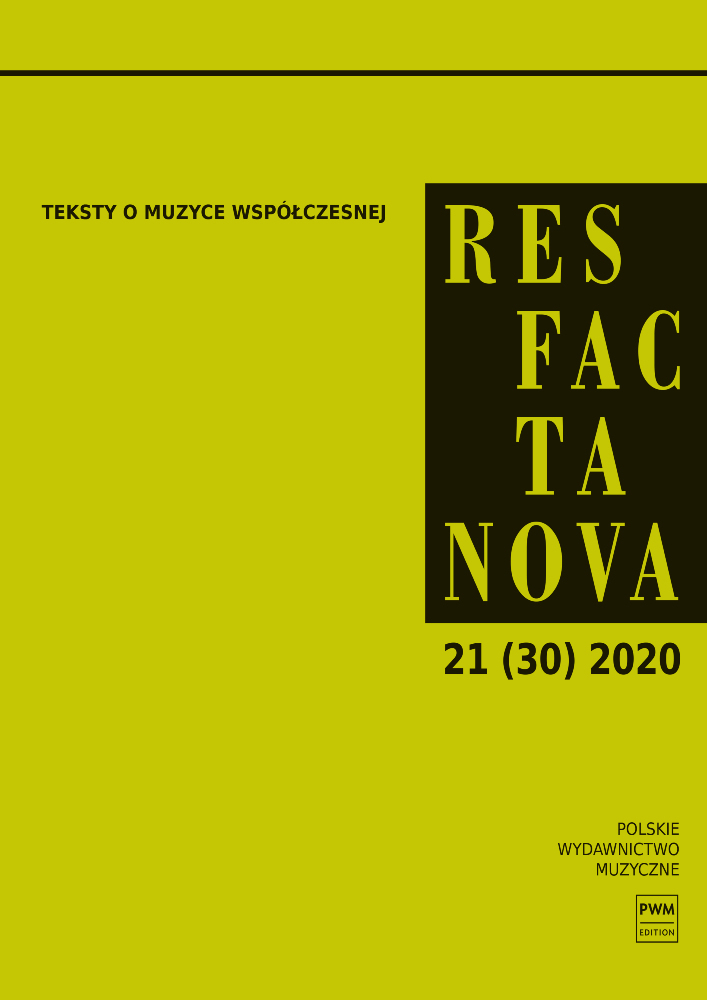Abstrakt
The article focuses on issues of microhistory and the usefulness of this historiographical practice in musicological research. The author begins by presenting the key issues relating to microhistory, referring extensively to the book What Is Microhistory? by István M. Szijártó and Sigurður Gylfi Magnússon. She then quotes and briefly discusses the most significant musicological works which employed microhistorical strategy. These are Mark Everist’s book Music Drama at the Paris Odéon, 1824–1828, Tamara Levitz’s Modernist Mysteries: Perséphone and Peter J. Schmelz’s article “Shostakovich” Fights the Cold War: Reflections from Great to Small. The main part of the text is devoted to Mark Ferraguto’s monograph Beethoven 1806. That publication is wholly based on the microhistorical approach, thus open- ing a new perspective in reflection on the instrumental works by the Master from Bonn. Ferraguto analyses Beethoven’s works from 1806 and early 1807 in the context of the people and the instruments for which they were composed; he also explores the nature of and reasons for the composer’s retreat from the „heroic phase”, analysing various aspects of contemporary musical, social and political life in Vienna. He does so while concentrating on selected, characteristic moments which define the given opus.
Unlike the earlier musicological works based on the microhistorical strategy, Ferraguto’s monograph is not overburdened with detail, but makes an excellent job of linking contextual issues with analysis of musical composition. In this way it enriches musicological research by providing it with a new, interesting dimension.
Bibliografia
Bonds Mark E., The Beethoven Syndrome. Hearing Music as Autobiography, Oxford University Press, New York 2020.
Burke Peter, The Microhistory Debate, [w:] New Perspectives on Historical Writing, red. Peter Burke, wyd. II, Polity Press, Cambridge 2001.
Burke Peter, Unity and Variety in Cultural History, [w:] idem, Varieties of Cultural History, Polity Press, Cambridge 1997, s. 183–212.
Clark Maribeth, Review: Music Drama at the Paris Odéon, 1824–1828, by Mark Everist. Berkeley, Los Angeles, and London: University of California Press, 2002. xvii, 331 pp., „Journal of the American Musicological Society” 2005 t. 58 nr 3, s. 717–723.
Domańska Ewa, Mikrohistorie. Spotkania w międzyświatach, wyd. II, Wydawnictwo Poznańskie, Poznań 2005.
Domańska Ewa, Posłowie. Historia antropologiczna. Mikrohistoria, [w:] Natalie Zemon Davies, Powrót Martina Guerre’a , przeł. Przemysław Szulgit, Wydawnictwo Zysk i S-ka, Poznań 2011.
Everist Mark, Music Drama at the Paris Odéon, 1824–1828, University of California Press, Los Angeles–London 2002.
Ferraguto Mark, Beethoven 1806 (AMS Studies in Music), Oxford University Press, New York 2019.
Kisantal Tamás, Review: What Is Microhistory? Theory and Practice by István M. Szijártó and Sigurður Gylfi Magnússon, „The Hungarian Historical Review” 2015 t. 4 nr 2, Cultures of Christian–Islamic Wars in Europe (1450–1800), s. 512–517.
Levitz Tamara, Modernist Mysteries: Perséphone, Oxford University Press, Oxford–New York 2012.
Ludwig van Beethoven: Die Werke im Spiegel seiner Zeit, red. Stefan Kunze, Laaber-Verlag, Lauber 1987.
Microhistory and the Historical Imagination: New Frontiers, red. Thomas Robisheaux, Thomas V. Cohen, Istvän M. Szijártó, „Journal of Medieval and Early Modern Studies” January 2017 t. 47 nr 1.
Microhistory Today: A Roundtable Discussion, „Journal of Medieval and Early Modern Studies” January 2017 t. 47 nr 1, s. 7–52.
Minors Helen J., Review: Tamara Levitz, Modernist Mysteries: Perséphone. Oxford and New York: Oxford University Press 2012, „H-France Review” May 2016 t. 16 nr 56, s. 1–4.
Nabożny Marcin, Mikrohistoria w historiografii. Publikacje o Kolbuszowej przyczynkiem do makrohistorii, „Rocznik Kolbuszowski” 2011 t. 11, s. 227–234.
„Past & Present”; Supplement t. 242 Issue Supplement_14, November 2019: Global History and Microhistory, https://academic.oup.com/past/issue/242/Supplement_14 (26.08.2020)
Reimer Erich, Der Begriff des wahren Virtuosen in der Musikästhetik des späten 18. und frühen 19. Jahrhunderts, „Basler Jahrbuch für historische Musikpraxis” 1996 t. 20, s. 61–72.
Robisheaux Thomas, Microhistory and the Historical Imagination: New Frontiers [Introduction], „Journal of Medieval and Early Modern Studies” January 2017 t. 47 nr 1, s. 1–6.
Schmelz Peter J., “Shostakovich” Fights the Cold War: Reflections from Great to Small, „Journal of Musicological Research” 2015 t. 34 nr 2, s. 91–140. https://doi.org/10.1080/01411896.2015.1020250.
Szijártó Istvän M., Sigurður Gylfi Magnússon, What Is Microhistory? Theory and Practice, Routledge, London–New York 2013.
The Oxford Handbook of Topic Theory, red. Danuta Mirka, Oxford University Press, New York 2014.
Triest Johann K.F., Abhandlung: Über reisende Virtuosen, „Allgemeine musikalische Zeitung” t. 4 nr 46 (August 11, 1802): szp. 737–49, nr 47 (August 18, 1802): szp. 753–60 i nr 48 (August 23, 1802): szp. 769–75.
Tyson Alan, Beethoven’s Heroic Phase, „Musical Times” February 1969 t. 110 nr 1512, s. 139–141.
Walsh Stephen, Review: Tamara Levitz, Modernist Mysteries: Perséphone, Oxford and New York: Oxford University Press 2012, „Journal of the Society for Musicology in Ireland” 2013–14 t. 9, s. 65–68.

